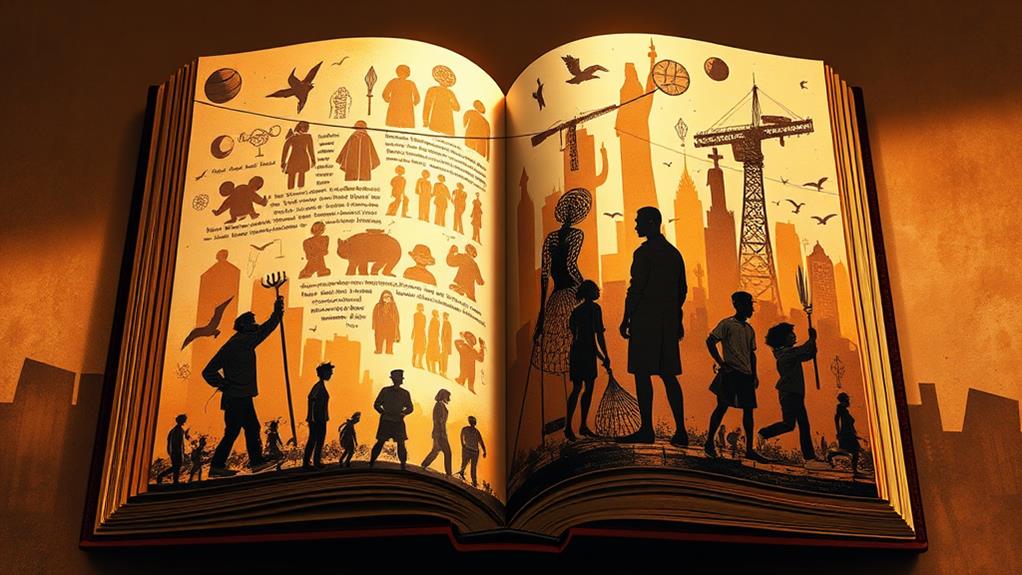Middlesex is a unique novel that challenges societal expectations and inspires deep thought about identity and heritage. You'll journey through the life of Calliope, later known as Cal, as she navigates her intersex identity against a backdrop of immigration and family secrets. The rich themes of gender fluidity and cultural heritage resonate with many readers, prompting emotional connections. While some mention pacing issues, the portrayal of personal struggles remains compelling. Critics and audiences alike praise its insightful exploration of identity. Stick around to uncover more insights about this profound literary work!
Overview of Middlesex
Middlesex intricately weaves the story of the Stephanides family across three generations, offering a rich tapestry of experiences that span from a small Greek village to the heart of Detroit. The narrative centers on Calliope Stephanides, later known as Cal, who's born intersex.
As you probe into the pages, you'll witness Cal navigate complex themes of gender identity and familial heritage against the backdrop of significant historical events, mirroring the exploration of resilience and personal growth found in classics like David Copperfield.
Jeffrey Eugenides masterfully captures the Stephanides family's migration from Smyrna during the Turkish invasion to their life in Detroit, exploring the socio-economic shifts the city faced during Prohibition and the 1967 race riots. You'll find that the vivid imagery and profound character development elevate the story, allowing you to connect deeply with the characters and their struggles.
Middlesex has garnered critical acclaim, winning the Pulitzer Prize for Fiction in 2003, and is celebrated for its sensitive exploration of intersex identity within a broader family saga.
The novel challenges you to reflect on the intricacies of identity across generations, making it not just a story, but an inspiring exploration of what it means to belong.
Themes Explored in the Novel
In "Middlesex," you'll encounter a rich exploration of identity and heritage as Calliope navigates her intersex experience.
The novel challenges your understanding of gender and societal norms, pushing you to reconsider what defines belonging. Much like Ta-Nehisi Coates' reflections on the complexities of racism, the narrative encourages readers to confront uncomfortable truths about identity.
Additionally, the Stephanides family's immigrant story highlights how cultural backgrounds shape individual identities in a complex world.
Identity and Heritage
Steering through the intricate layers of identity and heritage, Calliope's journey highlights the profound ways these elements intertwine to shape who we are. Born intersex, Calliope's identity is a complex mosaic of genetics, family history, and cultural background.
The Stephanides family's migration from Greece to America serves as a powerful symbol of the immigrant experience, illustrating how heritage molds identity across generations. As you read, you'll discover how family secrets ripple through personal history, affecting self-perception and societal roles.
Calliope's transformation into Cal exemplifies the fluidity of identity. The novel challenges the rigid definitions of gender, suggesting that identity isn't a fixed point but a dynamic process influenced by culture and experience.
The narrative intertwines personal and genetic histories, emphasizing that your individual identity is shaped not only by your choices but also by your familial and cultural legacies. This exploration of identity and heritage invites you to reflect on how your own background influences who you are.
Ultimately, "Middlesex" inspires you to embrace the complexities of your own identity, recognizing the beauty in its multifaceted nature.
Gender and Society
Often, readers find themselves traversing the intricate landscape of gender identity in "Middlesex," where Calliope's transformation into Cal serves as a pivotal exploration of how society shapes our understanding of gender.
Jeffrey Eugenides explores the complexities of intersex identity, highlighting the distinction between biological sex and gender as a social construct. Through Cal's journey, you see the pressures of societal norms that influence personal identity and family relationships, ultimately challenging traditional binary notions of gender.
The immigrant experience enriches this narrative, showcasing how cultural backgrounds impact perceptions of gender and societal roles within the Stephanides family.
As you engage with the characters, you're invited to reflect on a more fluid understanding of identity, one that transcends rigid classifications. The novel acts as a powerful commentary on the broader implications of societal expectations, pushing you to question the definitions of normality and belonging.
In "Middlesex," you witness the interplay between gender identity and societal constructs, prompting deeper reflection on how these themes resonate within your own experiences and the world around you.
Character Analysis

In "Middlesex," you witness Calliope's remarkable identity journey as she transforms into Cal, highlighting the intricacies of gender and self-discovery.
This exploration parallels the stories of historical figures whose identities have also shaped their narratives, revealing how overlooked contributions influence personal journeys.
The family dynamics, particularly through Lefty, Desdemona, and Milton, reveal how immigrant experiences and generational trauma shape their identities.
You'll also see how societal expectations impact each character, offering rich insights into the struggles of belonging and resilience.
Calliope's Identity Journey
Calliope Stephanides embodies the intricate struggle of self-discovery as she navigates her identity journey in *Middlesex*. Born intersex, Calliope faces unique challenges that force her to confront societal norms surrounding gender and identity. Her transformation into Cal during adolescence marks a pivotal moment, reflecting her quest for acceptance and understanding.
As you explore Calliope's journey, consider these key aspects:
- Intersex Identity: Calliope's biological condition shapes her experiences, pushing her to redefine what identity means.
- Family Expectations: The pressure from her family highlights the clash between personal identity and external perceptions of normality.
- Immigrant Experience: Calliope's heritage adds layers to her identity, illustrating the complexities of belonging in a new culture.
- Emotional Depth: Her story resonates deeply, showcasing both triumphs and challenges that invite readers to empathize with her struggles.
Through Calliope, *Middlesex* explores the emotional depths of self-discovery, emphasizing that identity isn't a fixed concept but rather a transformative journey shaped by personal and familial histories.
Family Dynamics Explored
Steering through the intricate web of family dynamics in *Middlesex*, you'll uncover how intergenerational trauma and hidden secrets shape the identities of the Stephanides family.
Calliope Stephanides serves as a focal point, grappling with the weight of her family's immigrant experience while maneuvering her own gender identity. Her grandparents, Lefty and Desdemona, embody the cultural tensions that arise when families adapt to a new life in America, setting the stage for Calliope's journey.
As you probe deeper, you'll see how familial expectations clash with personal authenticity. The relationship between Calliope and her mother, Tessie, reveals the emotional strain that comes from trying to meet parental hopes while seeking true self-acceptance.
This struggle highlights the impact of societal norms on gender identity and sexuality, emphasizing the difficulties faced by those who diverge from traditional roles.
Ultimately, *Middlesex* intricately weaves together themes of heritage and identity, illustrating how the Stephanides family's past profoundly influences each member's present.
The exploration of these family dynamics not only enriches the narrative but also resonates with anyone maneuvering their own complexities within familial relationships.
Societal Impact on Characters
Maneuvering the societal expectations of gender identity and cultural heritage, characters in *Middlesex* reveal the profound impact of external pressures on their lives. You see Calliope, who evolves into Cal, grappling with the tension between personal truth and society's rigid norms. The immigrant experience of Lefty and Desdemona illustrates cultural assimilation's challenges, which shape their children's identities and choices.
Consider these key aspects:
- Familial Secrets: The history of intersex traits complicates relationships, revealing how societal taboos can distort identity.
- Generational Shift: Attitudes toward sexuality evolve, highlighting the contrast between Cal's journey and previous generations' expectations.
- Societal Taboos: These pressures force characters to navigate complex identities, often leading to internal conflict.
- Self-Acceptance: Cal's quest for self-acceptance illustrates the struggle against inherited expectations, emphasizing the importance of personal authenticity.
Through these lenses, *Middlesex* showcases how societal influences shape individual lives, reflecting broader themes of identity, acceptance, and resilience.
Reader Perspectives
When diving into *Middlesex*, you might find that readers' perspectives vary widely, reflecting the novel's rich tapestry of themes and emotions. Many readers resonate deeply with the narrative, particularly appreciating how Eugenides sensitively portrays Calliope's journey exploring intersex identity. This exploration connects them to complex themes of gender and personal identity, creating an emotional resonance that lingers long after finishing the book.
The narrative also echoes elements of resilience, much like the story of Louis Zamperini in the triumph of the human spirit, showcasing how personal struggles can lead to profound growth and understanding.
However, some readers note pacing issues that detract from their enjoyment of the story, feeling that certain sections slow down the momentum. On the flip side, reviews often highlight the exceptional character development, with Eugenides crafting relatable characters whose flaws and struggles mirror real-life experiences.
The depth of family dynamics comes through in their interactions, enriching the narrative further. Additionally, readers appreciate the historical context of the family's migration from Greece, which adds layers to the story and provides insight into socio-economic changes in Detroit.
This multifaceted approach makes *Middlesex* a recommended read for anyone interested in themes of identity, acceptance, and the complexities of family life.
Historical Context and Significance

The historical context of *Middlesex* plays an essential role in shaping the narrative and deepening your understanding of the Stephanides family's journey. As you explore their story, you'll see how various historical events intertwine with personal experiences, affecting identity formation and cultural expectations. The immigrant experience, much like that depicted in Brooklyn's immigrant struggles, emphasizes the resilience and determination of families confronting socio-economic challenges.
Here are some key historical aspects that enrich your reading:
- Immigration: The Stephanides family's migration from a Greek village to Detroit highlights the challenges faced by immigrants in the early 20th century.
- Socio-economic Changes: The decline of the automobile industry during the 1960s and 1970s profoundly impacts the community's dynamics and the family's livelihood.
- Significant Events: Historical incidents like Prohibition and the 1967 Detroit race riots shape the characters' experiences and influence their identities.
- Intersex Identity: By examining intersex identity within this historical framework, *Middlesex* complicates traditional notions of gender, emphasizing the fluidity of identity against the backdrop of immigration and societal pressures.
Through these layers of history, you gain a deeper appreciation for how external factors mold individual lives and perceptions of gender and ethnicity in the novel.
Recommendations for Further Reading
Exploring the themes of identity and family history in *Middlesex* can lead you to a wealth of enriching literature that resonates with similar experiences.
Start with Jeffrey Eugenides' debut novel, *The Virgin Suicides*, which dives into the complexities of teenage life and loss through a suburban family tragedy. This novel complements *Middlesex* by exploring character dynamics and the pressures of adolescence.
Another essential read is *The Marriage Plot*, where Eugenides critically examines love and relationships within academia, shedding light on personal identity.
For a different perspective, check out his short story "Bronze," published in *The New Yorker*, which showcases his narrative style while touching on identity.
If you're particularly interested in intersex themes, consider engaging with literary analyses and critiques that discuss *Middlesex*'s impact on contemporary narratives. These resources can deepen your understanding of the novel and its significance in the broader context of identity and family history.
Lastly, participating in reader discussions and forums focused on *Middlesex* can enhance your insights and encourage diverse perspectives on its themes.
Happy reading!
Conclusion
In the garden of Middlesex, you find blossoms of identity that intertwine and flourish, reminding you that every story is a journey of discovery. Like a river carving its path through rock, the novel teaches you resilience amidst complexity. As you walk through these pages, you're not just a reader; you're a gardener, nurturing understanding and empathy. Embrace the layers of life, and let this tale inspire you to grow, just as the characters do within their rich tapestry.



